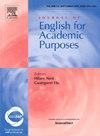协商出版之路:作者对同行评审的回应中的功能单元和词汇束
IF 3.4
1区 文学
Q1 EDUCATION & EDUCATIONAL RESEARCH
引用次数: 0
摘要
同行评议报告在验证研究质量和维护学术诚信方面的关键作用是公认的。然而,针对这些评论的作者回应信(ARLs)类型仍然是一个未被充分探索的领域,但在学术出版中同样重要。本研究试图通过分析功能单位和词汇束来填补这一空白,这些功能单位和词汇束表征了成功的arl。根据英国医学杂志的语料库,我们确定了作者-审稿人互动中的七个功能单元,包括两个高频率单元(表达感谢和讨论修订),三个常规单元(提供澄清,接受反馈和证明研究决定)和两个不常见单元(承认局限性和要求进一步的细节)。我们还发现了促进这些交际行为的反复出现的词汇束。与研究性文章相比,arl倾向于使用与主动动词相关的信息包,这有助于概述修订内容,并提高审稿人对回复的可访问性。频繁使用以参与者为导向的捆绑包进一步强调了该类型的对话性质,作者不仅要驾驭反馈的技术方面,还要驾驭社会修辞和人际动态。通过揭开这种高风险类型的神秘面纱,本研究不仅帮助作者应对审稿人的反馈,而且为EAP教学提供了教学资源。本文章由计算机程序翻译,如有差异,请以英文原文为准。
Negotiating the path to publication: Functional units and lexical bundles in author responses to peer review
The critical role of peer-review reports in validating research quality and upholding academic integrity is well recognized. The genre of author response letters (ARLs) which address these reviews, however, remains an underexplored, yet equally significant facet of academic publishing. This study seeks to fill this gap by analysing the functional units and lexical bundles that characterize successful ARLs. Drawing on a corpus from the BMJ, we identified seven functional units in this author-reviewer interaction, including two highly frequent units (Expressing gratitude and Discussing revisions), three regular units (Providing clarifications, Accepting the feedback, and Justifying research decisions) and two infrequent units (Acknowledging limitations and Requesting further details). We also identified the recurrent lexical bundles that facilitate these communicative acts. Compared with research articles, ARLs tend to favour active verb-related bundles, which serve to outline revisions and improve the accessibility of responses for reviewers. The frequent use of participant-oriented bundles further underlines the genre's dialogic nature, where authors must navigate not only the technical aspects of feedback but also the socio-rhetorical and interpersonal dynamics. By demystifying this high-stakes genre, this research not only aids authors in coping with the reviewer feedback, but also informs pedagogical resources for EAP instruction.
求助全文
通过发布文献求助,成功后即可免费获取论文全文。
去求助
来源期刊

Journal of English for Academic Purposes
Multiple-
CiteScore
6.60
自引率
13.30%
发文量
81
审稿时长
57 days
期刊介绍:
The Journal of English for Academic Purposes provides a forum for the dissemination of information and views which enables practitioners of and researchers in EAP to keep current with developments in their field and to contribute to its continued updating. JEAP publishes articles, book reviews, conference reports, and academic exchanges in the linguistic, sociolinguistic and psycholinguistic description of English as it occurs in the contexts of academic study and scholarly exchange itself.
 求助内容:
求助内容: 应助结果提醒方式:
应助结果提醒方式:


